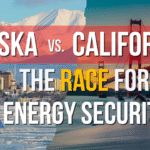Energy News Beat
The price fear factor for crude oil rose following the Oct. 7 Hamas terrorist attacks on Israel, and crude prices continued to rise in subsequent weeks over fears the conflict could escalate region-wide.
But in recent days, this fear premium in prices has all but disappeared from the market as such concerns have dissipated.
The international Brent crude benchmark prices dropped as low as $82/barrel on Nov. 7, well below the Oct. 6 closing price of $84.58, as fighting has remained centered in Israel and Gaza despite weeks of saber rattling by Iran’s Islamic rulers and sporadic firing of missiles into Israel by Hezbollah terrorists, who, like Hamas, are supported by Iran and other terror-supporting nations.
Initial concerns were driven mainly by concerns the conflict could widen across the Middle East and eventually threaten the free flow of oil out of the Persian Gulf through the Strait of Hormuz. Such fears are valid given that about 20%-25% of global oil production must traverse through this critical gateway each day to make its way to importing markets around the world.
Indeed, protecting this flow of oil has been a major objective of U.S. foreign policy and military operations in the region since shortly after the end of the second World War.
More recently, such concerns have extended to the flow of liquefied natural gas through the Strait. Qatar, located on the central western coast of the Persian Gulf, ranks as one of the three largest LNG-exporting nations, along with the U.S. and Australia. 100% of Qatar’s LNG exports flow through the Strait of Hormuz.
The fact that Qatar also is a major funder of Hamas, whose headquarters are housed in the Qatari capital city of Doha, only served to reinforce such concerns.
Although Iran and many Arab nations have continued to register objections to Israel’s response to the Hamas attacks, it has become increasingly apparent that none of them feel strongly enough about it to commit military assets to a widening war. Any such escalation would risk a response not only from Israel, but also from the United States, which has moved two aircraft carrier groups into the region and beefed up its military assets on the ground as well.
What it all means in the U.S. is lower prices than expected for both gasoline and diesel, both of which had spiked in the wake of Hamas attacks. Gas prices at the pump have dropped by about 9% over the past month, with diesel seeing similar declines.
The fall in prices has been helped along by seasonal factors that have resulted in reduced refining margins for those products. This provides consumers with some welcome relief from inflationary pressures just as the holiday season rolls around.
The lower oil prices also ease concerns among some analysts that the Biden administration could decide to raid the U.S. Strategic Petroleum Reserve for political purposes again as the 2024 election season starts to ramp up in earnest. President Joe Biden’s massive drawdown of the reserve, taking out 1 million barrels per day for 180 days during the 2022 campaign season, has already left the SPR at low levels not seen in 40 years, a risky situation with the U.S. now engaged in war efforts on two separate continents along with rising tensions between China and Taiwan.
For the domestic U.S. oil and gas industry, it means companies are able to conduct business as usual and enhances their ability to predict business conditions into the future. It also means a more stable environment where supply chains and cost factors are concerned.
The easing of this oil price fear factor is, in other words, better for all involved. History tells us such conditions seldom seem to last for long, though, as another storm is always on the horizon.
Best advice is for everyone to enjoy it while it lasts.
David Blackmon is an energy writer and consultant based in Texas. He spent 40 years in the oil and gas business, where he specialized in public policy and communications.
The views and opinions expressed in this commentary are those of the author and do not reflect the official position of the Daily Caller News Foundation.
ENB Top News
ENB
Energy Dashboard
ENB Podcast
ENB Substack
The post DAVID BLACKMON: Fear Factor Surrounding Oil Prices Has Vanished appeared first on Energy News Beat.








